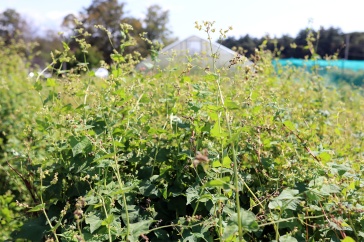UNH Researchers Investigate Climate Tolerant Buckwheat Crop For Future Commercial Use

UNH researchers have begun a Tartary buckwheat breeding and growing program to investigate and develop the lesser-known crop that has high nutritional value and is climate tolerant making it suitable for a wide variety of soil types, across a wide range of climates and weather conditions.
DURHAM, N.H.—This year’s rain, floods and freezing temperatures are a reminder farmers need many strategies to find resilient crops, especially for food production. Researchers at the New Hampshire Agricultural Experiment Station (NHAES) at the University of New Hampshire believe they have an excellent candidate—Tartary buckwheat (Fagopyrum tataricum), an underutilized and lesser-known crop with high nutritional value and unique qualities that make it suitable for production on a wide variety of soil types and across a wide range of climates and weather conditions.
“The last two growing seasons were tough on farmers—hot and extremely dry one year and then so wet this year that farmers struggled to get onto their fields to plant,” said Iago Hale, associate professor of sustainable agriculture and food systems and a NHAES scientist. “A species like Tartary buckwheat is climate-ready in the sense that it tolerates extreme temperatures and extreme moisture and drought. It matures fast, giving producers flexibility to integrate it into their cropping systems. It also establishes quickly, outcompeting weeds and grows in poor soils without demanding costly inputs.”
The study began with Hale and Noah Abasciano, a graduate student, requesting seeds of the full collection of 78 Tartary buckwheat accessions, or genetically distinct plants, maintained by the USDA. Because there has been limited research done on the species to date, the researchers need to first determine the desired traits for production. They started by growing the seeds in UNH’s Macfarlane Research Greenhouses in the fall of 2022 and the following spring sowed them in small plots at UNH’s Woodman Horticultural Research Farm. That gave the researchers a first look at the plant’s performance in the field in addition to evaluating different planting dates—late spring, early summer and mid-summer.
Tartary buckwheat can grow in just a few months, letting researchers quickly identify which genetically distinct plants have desirable characteristics for breeding into an improved and commercially viable variety. The ideal plant would be short, germinate and establish quickly, produce lots of seeds that stay attached to the plant, and not fall over easily.
“In this first look at the collection, we've been excited to see lines exhibiting some of those characteristics,” said Abasciano. “But of course, no one line has the complete package. That’s where breeding comes in—we’ll pick the ones with good height and low lodging and shattering and try to combine them.”
In addition to its climate resiliency characteristics, Tartary buckwheat is gluten free and contains more than double the amount of protein found in common grains, as well as high levels of essential amino acids, minerals, and one of the highest levels of the plant pigment known as rutin. Rutin has strong anti-inflammatory and antioxidant properties and has been shown to improve blood vessel health and decrease arthritis.
Currently, Tartary buckwheat is grown commercially on only a handful of U.S. farms and almost entirely in northern states with cool climates and shorter growing seasons. In mountainous sections of Southern China and other Asian countries, Tartary buckwheat is much more common and is prized for its nutritional value and its ability to grow in poor quality soil.
For now, at this small research scale, careful harvesting takes place by hand. However, when grown at a commercial scale, the plants could be harvested with traditional small grain harvesting equipment.
Funding for this project is supported by the NHAES through joint funding from the USDA National Institute of Food and Agriculture and the state of New Hampshire.
The University of New Hampshire inspires innovation and transforms lives in our state, nation and world. More than 16,000 students from 49 states and 82 countries engage with an award-winning faculty in top-ranked programs in business, engineering, law, health and human services, liberal arts and the sciences across more than 200 programs of study. A Carnegie Classification R1 institution, UNH partners with NASA, NOAA, NSF, and NIH, and received over $210 million in competitive external funding in FY23 to further explore and define the frontiers of land, sea and space.
PHOTOS AVAILABLE FOR DOWNLOAD
https://colsa.unh.edu/file/45865
Noah Abasciano, a UNH graduate student, stands in a plot of Tartary buckwheat plants being grown at UNH’s Woodman Horticultural Research Farm in Durham. Abasciano, along with associate professor and plant breeder Iago Hale, are developing a breeding and growing program at UNH for Tartary buckwheat, an underutilized and lesser-known relative of common buckwheat.
https://colsa.unh.edu/file/45863
UNH researchers began the Tartary buckwheat breeding and growing program this past winter at the Macfarlane Research Greenhouses. Over the summer, they grew 78 genetically diverse lines of Tartary buckwheat at the Woodman Horticultural Research Farm.
https://colsa.unh.edu/file/45862
Tartary buckwheat seeds. The grain, which is gluten free, has several favorable nutritional elements.
Latest News
-
December 12, 2024
-
December 11, 2024
-
November 22, 2024
-
November 7, 2024
-
October 30, 2024
















































